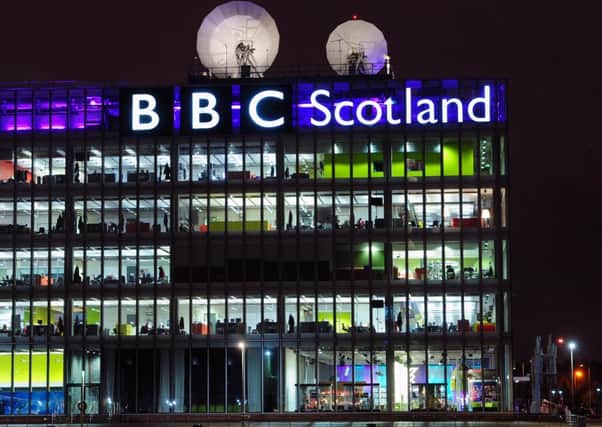BBC urged to launch Scots political coverage review


In a wide-ranging review of how the BBC is meeting audience demands in Scotland, an advisory board to the BBC Trust warned of concerns among the public over the impartiality and analysis underpinning the corporation’s coverage of Scottish life.
Bill Matthews, Scotland’s representative on the trust, said the BBC must “consider carefully” ongoing political coverage and “reassess its offering” in light of the general election and last year’s referendum on Scottish independence.
Advertisement
Hide AdAdvertisement
Hide AdMr Matthews, chair of the Audience Council Scotland, the body which advises the trust, said that while the corporation continues to produce “high-quality independent journalism” from Scotland, its network coverage was “inadequate” and seen to adopt an “Anglified’ perspective” when reporting on the referendum to the rest of the UK.
The BBC said last night it stood by its referendum coverage, describing it as “fair and impartial”.
But culture secretary Fiona Hyslop accused the UK Government and the BBC of “continuing to sell Scotland short on broadcasting”, adding that the lack of Scottish input on its charter renewal demonstrated a “clear breach” of the Smith Commission agreement on the BBC, which detailed a “formal consultative role” for the Scottish Government and the Scottish Parliament.
In the council’s annual review, published yesterday, Mr Matthews said there were “differing audience views on the overall quality” of its referendum coverage, with some licence fee payers of the view that the BBC was “unfavourable to the Yes campaign” and “part of a wider media establishment whose perspectives reflected those of the status quo”.
In his foreword to the report, Mr Matthews said of the BBC’s audience: “Some felt an appetite for analysis was not fully met and some that network coverage came too late.
“Others voiced concerns about BBC impartiality.” He added: “The BBC rightly chose not to intervene in the debate although its own future was one of the topics under discussion. However, the council believes it is very important that the BBC now consider carefully all the issues that have been raised.
“The election result in May poses new challenges for BBC network news to properly explain the differing policy landscape across the nations of the UK. And in the wake of the referendum, it is important that the BBC reassess its offering for audiences in Scotland and the way in which it is accountable to licence payers here.”
The BBC’s annual report also highlighted areas of concern when it comes to representing a Scottish audience. Whereas 61 per cent of people in England and Northern Ireland and 55 per cent of those in Wales believe the BBC is good at representing their life in news and current affairs content, the figure falls to 48 per cent in Scotland.
Advertisement
Hide AdAdvertisement
Hide AdThe council praised a series of BBC Scotland documentaries on the referendum and the online resources available, but added: “Members questioned whether, overall, the coverage had captured the popular nature of the campaign and the increased role of social media.”
The report added: “The council also felt that BBC network programmes, overall, did not engage with the issues until too late a stage, and that some had been less well informed, and that this diluted the value of the coverage at both Scottish and UK levels.
“There was some audience perception that network correspondents were increasingly used in place of BBC Scotland correspondents in the final weeks of the campaign.”
Ms Hyslop said: “Today’s annual report from the BBC shows not only that Scotland is again the only part of the UK where more than half of the people do not believe the BBC is properly reflecting life in their nation, but that Scotland’s share of network production has also fallen.
“It’s therefore extremely disappointing that the UK Government has failed to seek the Scottish Government’s view on either the licence fee settlement or the recent appointments to the advisory panel on charter renewal.
“As a result, Scotland’s views appear to be, at best, under-represented on the panel advising on BBC charter renewal and funding.
“The UK Government’s actions demonstrate that Scotland is not yet being fully consulted on matters relating to charter renewal, and represent a clear breach of the Smith Commission agreement on the BBC.”
However, Liz Smith, culture spokeswoman for the Scottish Conservatives, said: “The paranoia among nationalist supporters about media bias was ludicrous in the extreme. Like other media outlets, the BBC did a fair and fantastic job in covering the referendum.
Advertisement
Hide AdAdvertisement
Hide Ad“Every political cause would like more favourable coverage, so the fact everyone thinks this about the BBC probably indicates it did a good job.”
With BBC Scotland braced for further cuts as part of a £50m network-wide savings drive announced earlier this month, the Trust’s review, produced with input from Audience Council Scotland, looks set to prompt much discussion at its Pacific Quay HQ.
A spokeswoman for the BBC said: “We stand by our coverage of the referendum which was fair and impartial. No complaints about impartiality were upheld by the BBC Trust.”